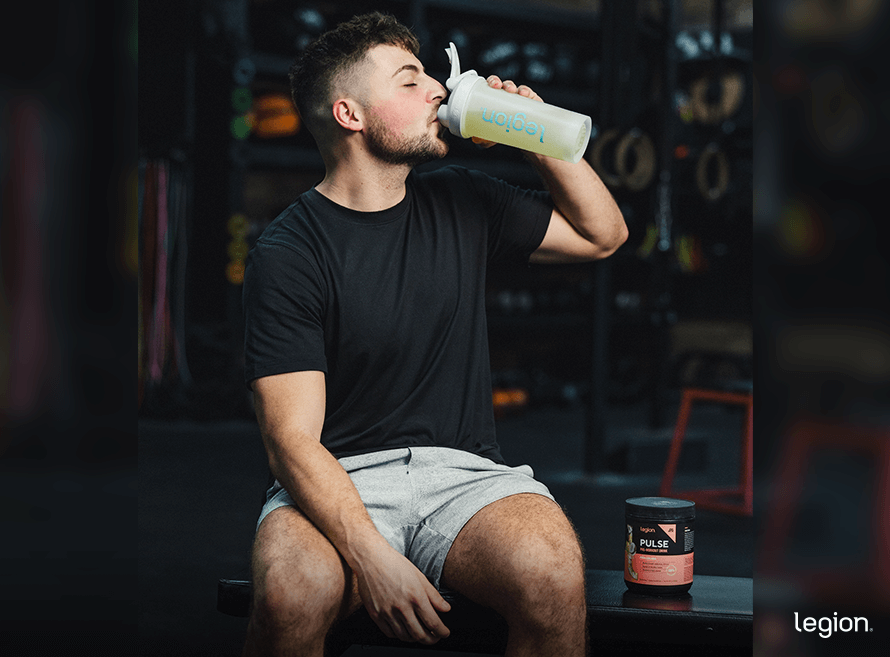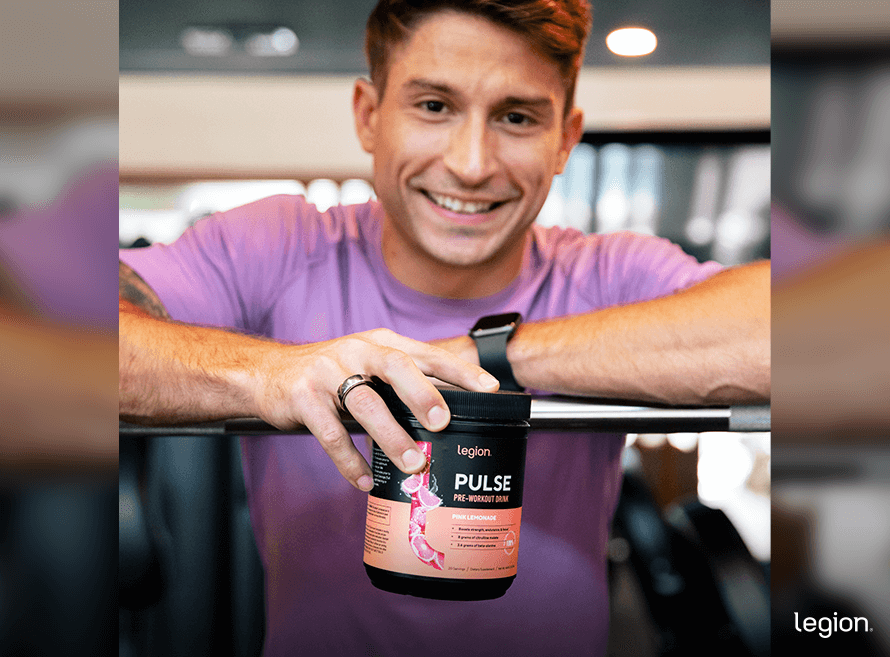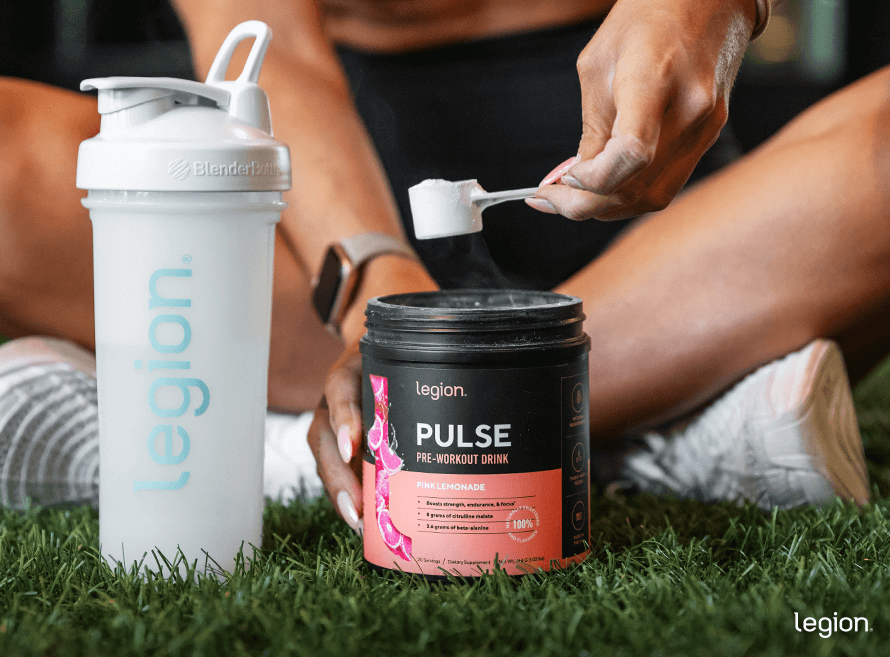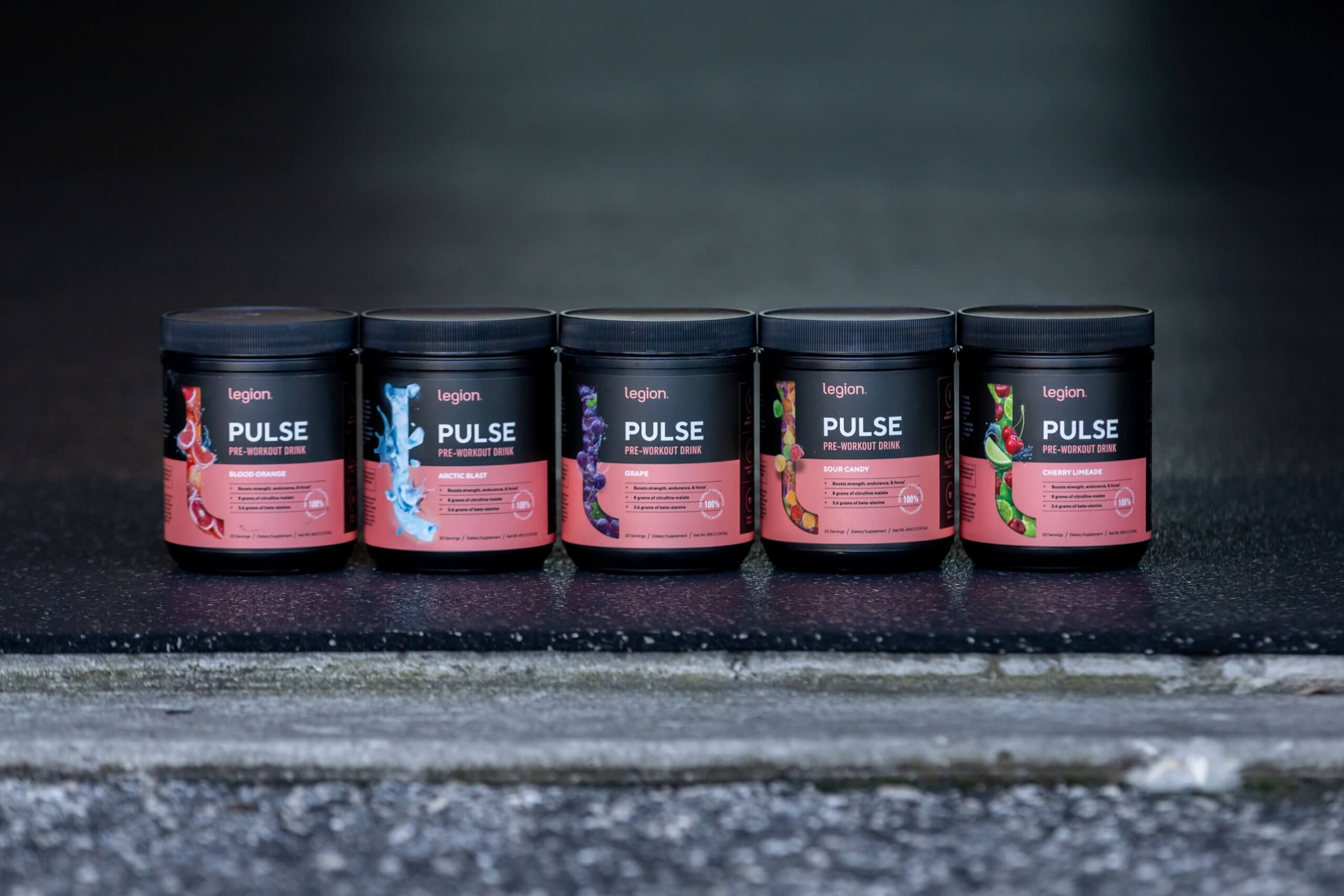“Does pre-workout make you poop?”
That may seem like a silly question, but it’s one many people ponder.
Why do you feel the need to use the bathroom after taking pre-workout?
What other factors contribute to pre-workout-induced pooping?
And how can you choose a pre-workout that boosts your performance without making you rush to the restroom?
Get evidence-based answers to these questions and more in this article.
Key Takeaways
- Yes, pre-workout can make you poop. Ingredients like caffeine, magnesium, vitamin C, sodium bicarbonate, and some artificial sweeteners can stimulate digestion and bowel movements.
- Taking pre-workout on an empty stomach increases the likelihood of needing to use the bathroom because the ingredients are absorbed more quickly.
- Switching to a low-stim energy drink or a stim-free pre-workout can help prevent digestive discomfort by reducing or removing caffeine, which is usually the main culprit.
- Going to the bathroom before training isn’t necessarily a bad thing—research suggests it may even improve comfort, focus, and performance during your workout.
- For a naturally flavored and sweetened pre-workout containing clinically effective doses of performance-boosting ingredients, try Pulse or stim-free Pulse.
What Is A Pre-Workout?
A “pre-workout” is a sports nutrition supplement taken before training to enhance energy levels and exercise performance.
They usually contain a mix of ingredients, such as caffeine, citrulline malate, and beta-alanine.
Why Do Pre-Workouts Make You Poop?

Many pre-workout powders contain ingredients that interact with your digestive system and stimulate bowel movements.
Common pre-workout ingredients with this side effect are sodium bicarbonate, vitamin C, magnesium, caffeine, and artificial sweeteners.
Caffeine
Caffeine is probably the most common pre-workout ingredient. In some cases, supplements contain as much as 600 mg of caffeine (more than 6 times the caffeine content of a cup of caffeinated coffee).
Caffeine is a pre-workout mainstay because it boosts athletic performance by improving strength, promoting muscle endurance, and enhancing anaerobic performance. However, it also impacts your digestive system.
Specifically, caffeine stimulates colonic motor activity—the process of moving your gut’s contents through the digestive tract. In other words, it gets your colon rollin’.
Artificial Sweeteners
Many pre-workout supplements contain large amounts of artificial sweeteners.
Studies show that consuming large quantities of these sweeteners can cause digestive issues and laxative effects, particularly for those with sensitive stomachs.
Magnesium
Magnesium plays a crucial role in muscle function and energy metabolism and is, therefore, a common ingredient in pre-workout formulas.
Beware though, high doses can draw water into your intestines, speeding up digestion and potentially leading to untimely restroom trips.
Vitamin C
Supplement companies sometimes include vitamin C in pre-workout powders as a flavoring and to potentially accelerate post-exercise recovery by reducing inflammation (which may also blunt some of exercise’s positive effects).
The downside is that taking large doses can upset your stomach.
That said, most pre-workouts don’t contain enough vitamin C to cause this effect alone. Thus, it’s only a concern if you also consume a diet rich in vitamin C.
Sodium Bicarbonate
Some people take sodium bicarbonate (baking soda) as a “homemade” pre-workout because it may boost athletic performance.
However, baking soda can lead to a buildup of CO2 in the stomach, which commonly causes diarrhea.
Other Factors that Contribute to Pre-Workout Pooping

Timing
The timing of your pre-workout intake greatly influences its effect on your digestion.
For example, if you take pre-workout in the morning on an empty stomach, the ingredients are absorbed more quickly. This can make their stimulant effects come on stronger and more quickly—and may increase the likelihood you’ll need to use the bathroom soon after.
If you take pre-workout before an afternoon or evening workout, you’re less likely to experience digestive issues. That’s because the food you’ve eaten throughout the day prevents your body from absorbing the pre-workout as quickly.
Dosage
Ingredients like caffeine and artificial sweeteners have a “dose-dependent impact” on your body.
In other words, the more you consume, the higher your chances of experiencing side effects.
Therefore, finding products that include doses that maximize benefits without leading to unwanted effects is key.
Stomach Contents
The contents of your stomach can also influence how pre-workout affects your digestive system.
For instance, taking your supplement with food can slow digestion, potentially reducing any laxative effect.
On the other hand, taking pre-workout powder on an empty stomach can worsen its side effects.
How to Choose A Pre-Workout That Won’t Make You Poop

Go Low-Stim or Stim-Free
Of all the ingredients above, caffeine is the most likely to cause stomach upset and bowel movements.
Therefore, using a pre-workout that contains little or no caffeine can effectively prevent pre-workout-induced pooping.
You have two main options:
- A low-stim energy drink
- A stim-free pre-workout
Well-formulated energy drinks typically contain much less caffeine than standard pre-workout powders, along with ingredients that support focus, mood, and alertness (like taurine or L-theanine).
This makes them a good middle ground if you like the boost caffeine provides, without the digestive discomfort that can accompany large doses.
Stim-free pre-workout supplements, on the other hand, contain no stimulatory ingredients (e.g., caffeine) but still improve your athletic performance. This makes them an excellent option for those who experience digestive issues even with small amounts of caffeine.
Choose Natural Sweeteners and Flavors
Opting for pre-workout powders that contain natural sweeteners and flavors can help minimize digestive upset.
Generally, natural options are more digestible, potentially leading to fewer stomach problems than artificial alternatives.
Look for Clinically Effective Doses
Many people wrongly assume that when it comes to pre-workout ingredients, higher doses are better.
This is a misconception—most pre-workout ingredients only boost performance up to a certain point.
Taking more than this doesn’t improve your performance further, but it can increase your risk of experiencing side effects. For example, taking more beta-alanine than you need won’t enhance its endurance-boosting effects, but it will likely make your skin itch more.
Unfortunately, some supplement companies capitalize on the “more is better” mindset by including excessive doses of stimulants in their products. This makes their products appear more potent, even though they’re actually less effective (and potentially dangerous).
To avoid this trap, look for products containing clinically effective doses of each ingredient.
This means they include each ingredient at a level that confers the maximum benefits with the minimum side effects.
Is it Good to Poop Before Your Workout?
Many people think pooping after taking pre-workout is an inconvenience, but it can actually be a good thing.
When your rectum is full, your body has to divert a portion of its attention and nervous system resources to managing that discomfort. This can subtly increase your stress levels, interfere with bracing and breathing, and make it harder to stay focused during your workout.
By contrast, when you’ve recently been to the bathroom, your body is under less internal strain, which often means you’re more comfortable, calmer, and better able to breathe and brace while lifting heavy weights.
And there’s even research to back this up.
In a study conducted by the University of Taipei, triathletes performed better on a cognitive test after using the bathroom, suggesting that emptying the bowels may reduce internal stress and improve mental clarity.
Another study by the same laboratory found that pooping before exercise improved endurance performance. When athletes relieved themselves before a cycling test, they were able to exercise longer before they fatigued, likely because more blood and oxygen were available to the brain.
This doesn’t mean you need to force a bowel movement before every workout. If you feel fine without pooping before you train, you probably won’t notice a meaningful difference.
But if you often feel bloated, “heavy,” unable to brace comfortably, or generally distracted by your gut, going to the bathroom first may help you feel lighter, move better, and stay more focused while training.
The Best Pre-Workout

If you want a 100% naturally flavored and sweetened pre-workout supplement containing clinically effective doses of 6 performance-boosting ingredients like caffeine, citrulline malate, and beta-alanine, try Legion’s pre-workout powder, Pulse.
Or, if you’d prefer a 100% natural and stimulant-free pre-workout drink that boosts strength and stamina while reducing fatigue, try stim-free Pulse.
(If you’re uncertain whether Pulse suits your needs and budget, take the Legion Supplement Finder Quiz to learn what supplements are right for you. Click here to check it out.)
The Bottom Line on Whether Pre-Workout Makes You Poop
Pre-workout can make you poop because ingredients like caffeine, magnesium, bicarbonate, and certain sweeteners can stimulate your digestive system—especially when taken on an empty stomach or in high doses.
For some people, that urge is inconvenient. For others, going to the bathroom before training can actually help by improving comfort, focus, and even performance.
To minimize unwanted bathroom trips, choose a pre-workout that’s . . .
- Naturally flavored and sweetened
- Uses clinically effective doses, not excessive ones
If you still notice digestive issues, try taking your pre-workout with a small snack, reducing your dose, or switching to a lower-stimulant or caffeine-free option.
FAQ #1: Is pre-workout like a laxative?
No—pre-workout isn’t a laxative. However, ingredients commonly found in pre-workout—especially caffeine, higher doses of magnesium, and certain artificial sweeteners—can stimulate your digestive system and make you feel like you need to use the bathroom shortly after taking it.
FAQ #2: How do you prevent pre-workout pooping?
You can reduce the chance of needing to poop after taking pre-workout by:
- Using a low-stim energy drink or switching to a stim-free pre-workout
- Avoiding artificially sweetened products if they tend to bother your stomach
- Taking your pre-workout with a small snack
- Starting with half a serving and increasing your intake gradually
FAQ #3: Is it normal to have diarrhea after taking pre-workout?
It can happen, but it’s usually a sign that something in the pre-workout isn’t sitting well with you. If you regularly get diarrhea after taking pre-workout, try lowering your dose, taking it with a small snack, or switching to a low-stim or stim-free pre-workout.
Want More Content Like This?
Check out these articles:
Scientific References +
- Guest, Nanci S., et al. “International Society of Sports Nutrition Position Stand: Caffeine and Exercise Performance.” Journal of the International Society of Sports Nutrition, vol. 18, no. 1, 2 Jan. 2021, jissn.biomedcentral.com/articles/10.1186/s12970-020-00383-4, https://doi.org/10.1186/s12970-020-00383-4.
- Nehlig, Astrid. “Effects of Coffee on the Gastro-Intestinal Tract: A Narrative Review and Literature Update.” Nutrients, vol. 14, no. 2, 17 Jan. 2022, p. 399, www.ncbi.nlm.nih.gov/pmc/articles/PMC8778943/, https://doi.org/10.3390/nu14020399.
- J. Boekema, M. Samsom, G. P. van Be, P. “Coffee and Gastrointestinal Function: Facts and Fiction: A Review.” Scandinavian Journal of Gastroenterology, vol. 34, no. 230, Jan. 1999, pp. 35–39, https://doi.org/10.1080/003655299750025525. Accessed 25 Nov. 2020.
- Grembecka, Małgorzata. “Sugar Alcohols—Their Role in the Modern World of Sweeteners: A Review.” European Food Research and Technology, vol. 241, no. 1, 28 Feb. 2015, pp. 1–14, https://doi.org/10.1007/s00217-015-2437-7. Accessed 16 Oct. 2019.
- Lenhart, Adrienne, and William D Chey. “A Systematic Review of the Effects of Polyols on Gastrointestinal Health and Irritable Bowel Syndrome.” Advances in Nutrition, vol. 8, no. 4, 6 July 2017, pp. 587–596, www.ncbi.nlm.nih.gov/pmc/articles/PMC5508768/, https://doi.org/10.3945/an.117.015560. Accessed 20 Apr. 2020.
- Zhang, Yijia, et al. “Can Magnesium Enhance Exercise Performance?” Nutrients, vol. 9, no. 9, 28 Aug. 2017, p. 946, www.mdpi.com/2072-6643/9/9/946/htm, https://doi.org/10.3390/nu9090946.
- Bothe, Gordana, et al. “Efficacy and Safety of a Natural Mineral Water Rich in Magnesium and Sulphate for Bowel Function: A Double-Blind, Randomized, Placebo-Controlled Study.” European Journal of Nutrition, vol. 56, no. 2, 18 Nov. 2015, pp. 491–499, https://doi.org/10.1007/s00394-015-1094-8.
- Santos de Lima, Katieli, et al. “Effects of the Combination of Vitamins c and E Supplementation on Oxidative Stress, Inflammation, Muscle Soreness, and Muscle Strength Following Acute Physical Exercise: Meta-Analyses of Randomized Controlled Trials.” Critical Reviews in Food Science and Nutrition, vol. 10.1080/10408398.2022.2048290, no. 10.1080/10408398.2022.2048290, 9 Mar. 2022, pp. 1–14, https://doi.org/10.1080/10408398.2022.2048290. Accessed 28 Mar. 2022.
- Aguiar, Samuel Silva, et al. “Oxidative Stress, Inflammatory Cytokines and Body Composition of Master Athletes: The Interplay.” Experimental Gerontology, vol. 130, no. 130:110806., 1 Feb. 2020, p. 110806, pubmed.ncbi.nlm.nih.gov/31825853/, https://doi.org/10.1016/j.exger.2019.110806. Accessed 31 Dec. 2022.
- Compounds, Institute of Medicine (US) Panel on Dietary Antioxidants and Related. Vitamin C. Www.ncbi.nlm.nih.gov, National Academies Press (US), 2000, www.ncbi.nlm.nih.gov/books/NBK225480/.
- Kahle, Laura E., et al. “Acute Sodium Bicarbonate Loading Has Negligible Effects on Resting and Exercise Blood Pressure but Causes Gastrointestinal Distress.” Nutrition Research, vol. 33, no. 6, June 2013, pp. 479–486, https://doi.org/10.1016/j.nutres.2013.04.009. Accessed 1 Dec. 2019.
- Wei, Chen-Chan, et al. “Defecation after Magnesium Supplementation Enhances Cognitive Performance in Triathletes.” Sports Medicine and Health Science, 1 Apr. 2024, https://doi.org/10.1016/j.smhs.2024.04.001. Accessed 20 Apr. 2024.
- Wei, Chen-Chan, et al. “Defecation Enhances Cerebral Perfusion and Delays Fatigue in Elite Triathletes.” Journal of the International Society of Sports Nutrition, vol. 20, no. 1, 27 Apr. 2023, https://doi.org/10.1080/15502783.2023.2206380. Accessed 6 Apr. 2025.
